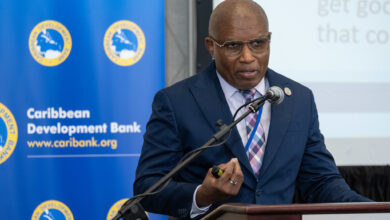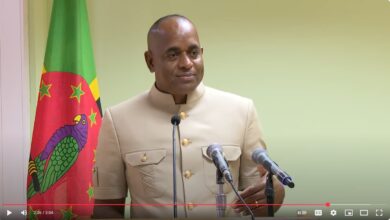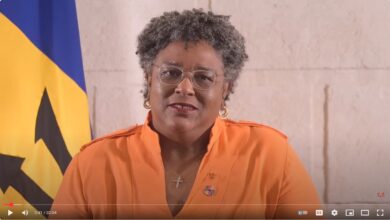(CARICOM Secretariat, Turkeyen, greater Georgetown, Guyana) Honourable Carolyn Rodrigues-Birkett, Minister of Foreign Affairs and Foreign Trade, Guyana, underscored the role of public education in helping CARICOM nationals to understand the process, challenges and the progress of the CARICOM Single Market and Economy (CSME), as well as their rights and responsibilities.
The Minister was speaking at a public education symposium to create greater awareness and understanding among Guyanese of the CARICOM Single Market and Economy (CSME). The Government of Guyana in collaboration with the European Union (EU)-funded Commonwealth Secretariat Hub and Spokes Project, organised the Public Symposium on the CSME, which was held on Wednesday 28 October at the Guyana International Conference Centre, Georgetown, Guyana and which saw a multi-sectoral representation from the private and public sectors, the Guyana Bar Association, Trade Union and Youth Organisations, and the Ministry of Education.
Much of the “disenchantment” with which persons regarded the CSME resided in their lack of knowledge, the Minister stated, adding that persons felt that the goals of the Grand Anse Declaration for the advancement of the Integration Movement of July 1989, were not being “translated into their day-to-day experiences.”
Notwithstanding, she said, “We cannot turn back now.”
“It is not a question of whether we have seen progress, but whether we can do more or whether we are doing enough,” she stated.
Minister Rodrigues-Birkett added that the challenges present in the world made the case more compelling for the Region to “act as one.”
She called for the deepening of the engagement between decision-makers and the wider population to eliminate what she described as a “top-down approach” to development within the CSME.
The Guyana Foreign Minister also highlighted the need for the systematic collection of data for a better understanding of how the CSME was working. This point was reiterated during an interactive segment of the symposium, during which members of the audience called for “concrete information” to make clear the volume of cross-country movement of skills, labour, and capital within the CSME.
In response to this, Mr. Ivor Carryl, Programme Manager of the CARICOM Secretariat’s CSME Unit, stated that a project was currently being finalised to establish a system of data collection for the efficient storage and retrieval of information pertaining to the functioning of the CSME.
In his remarks, Mr. Carryl, pointed out that the CSME, often perceived as a virtual operation, “does exist.”
“I am going to declare without contradiction that it does exist,” he said.
He noted that symposium came at a challenging time, when there were sharp contractions in global and regional economies, massive job losses and contractions in world trade. However, he said it was a time for CARICOM to “act in solidarity.”
Mr. Carryl stated that the overarching objective of the CSME was to create the environment for improved standard of living in a Community for all, and while challenges were present, progress was also evident.
Identifying those areas in which much strides have been made since the establishment of the Common Market in 1973, Mr. Carryl said that there was free movement of skills and labour, for nine categories of CARICOM nationals including household domestics- as was agreed by the CARICOM Heads of Government at their 30th Regular Meeting in July, Georgetown, Guyana. He also highlighted the movement of services and capital throughout the regional market place.
Mr Carryl said that efforts were made to consolidate the conditions under which the CSME could operate by establishing several super structures including the Revised Treaty establishing CSME; the Caribbean Court of Justice, which is concerned with the interpretation and operation of the Revised Treaty; the CARICOM Competition Commission; the CARICOM Development Fund; and the CARICOM Regional Organisation for Standards and Quality (CROSQ).
The CSME Programme Manager urged the gathering to examine the achievements of the CSME, identify the challenges to regional integration that were peculiar to Guyana, and plan strategies how the country’s export capacity could be developed to take advantage of the opportunities the Single Market presented.
The Public Symposium was held under the theme: “Understanding the CSME.”





